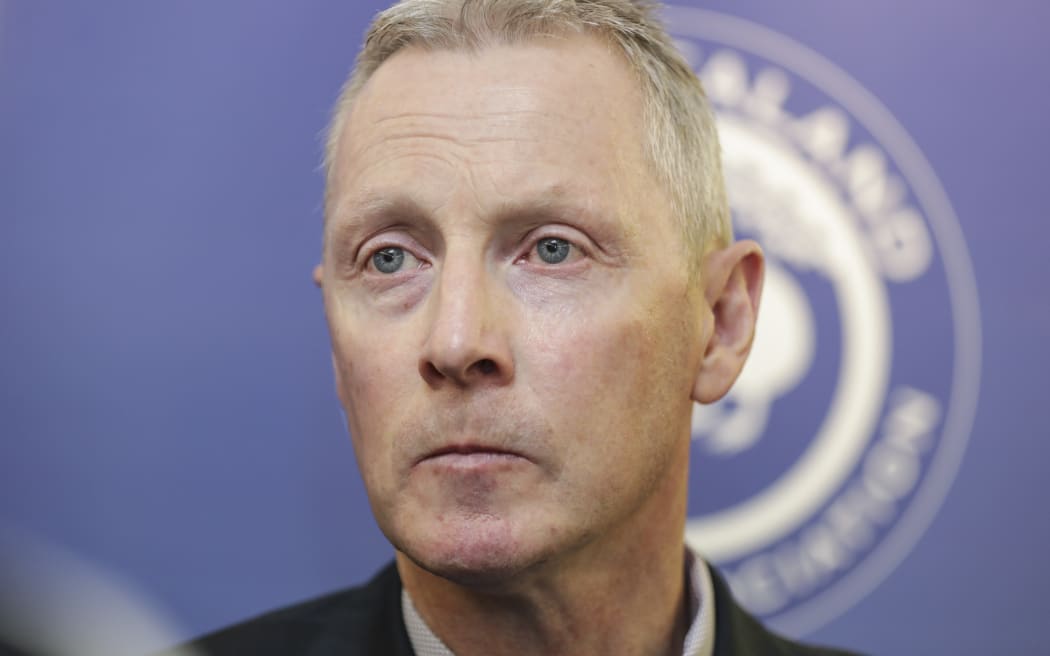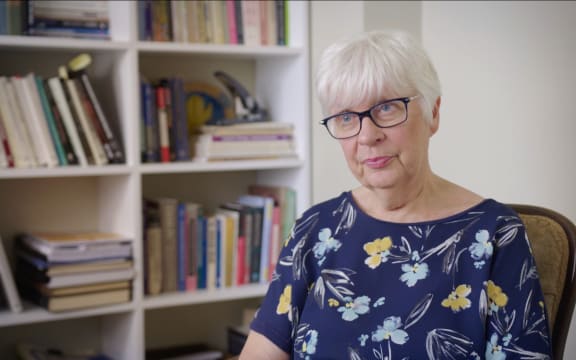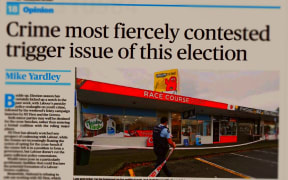
Police Association president Chris Cahill. Photo: RNZ / Rebekah Parsons-King
New law and order commitments from Labour have been met with a warm but 'believe it when I see it' reaction from police and justice advocates.
If re-elected, Labour is promising 300 new officers and legislation to crack-down on gang convoys, as well as a commitment to look at updating laws around stalking.
"We know that having more police on the beat means our communities will be safer," Labour leader Chris Hipkins said. "It means people will see police on the beat more, and it means the police will have more resources and more people to deal with crime as it arises."
The 300 new officers would deliver the largest police service in modern history, with a ratio of at least one officer for every 470 New Zealanders.
In 2017, the Labour-New Zealand First coalition promised 1800 new officers by 2020. But it was beset by missed deadlines and shifting of goalposts. An initial claiming of victory in 2019 failed to take into account officers who had left the service.
The target was eventually reached this year, but then it emerged not all of them were sworn officers.
Labour promised the 300 new officers would all be sworn officers.
Police Association president Chris Cahill said the number was both feasible and fundable.
"It's a solid commitment to actually get a number around it. We're pleased to see that, you can always have a debate on whether it's enough or how long it will take, but at least there's a clear number around this. At this stage, no other political party has put a clear number around what numbers they'll be able to increase police by."
Enter National, which agreed more officers were needed, but its police spokesperson Mark Mitchell was deeply sceptical about Labour's delivery. He said an increase in officers was nothing compared to the increase in gang members, violent crime and retail crime.
"Numbers are important, in terms of a law enforcement agency like our police. But the point I'm making is that Labour have just got no credibility around public safety. I don't pay much attention to what they're doing at all."

Mark Mitchell. Photo: RNZ / Angus Dreaver
Those new officers would also be given extra powers to crack down on gang intimidation, specifically gang convoys.
Police already have the power to impound vehicles, but new legislation could mean officers can seize a vehicle without conviction, when it was difficult to intervene at the time of offending. Labour police spokesperson Ginny Andersen said it would be easier for police to bring a case to prosecution.
"So, if there would be an intent to intimidate the public, and two or more driving along, committing some infringements, that would give the police the opportunity then to take those vehicles."
Cahill admitted there had been a lot of promises, and wanted to wait and see what bills made it before Parliament after the election.
He said he wanted to see more detail on how Labour's impound would work, but believed it had merit.
"If you can seize more vehicles with less red tape, that is something that really puts a gang under pressure. They don't want to lose their vehicles."
Labour's policy document included facts and statistics on what it had already done, such as expanding police powers to execute search warrants, the introduction of legislation to make a new offence for ram raiding, and a recently announced mental health co-response model.
It also said it would look at legislative options to reduce gang leaders' ability to operate, including going after prison recruitment and concealing assets.
National has already committed to gang crackdown measures such as banning gang patches in public places, warrantless search powers and dispersal notices.
Mitchell said more was likely to follow during the campaign, and said Labour was being cynical by taking the issue seriously this close to the election.
"We highlighted to the Labour government there was a growing gang threat in New Zealand. They needed to take some further action, which included a dedicated gang taskforce. And they mocked it, and they laughed about it, but they're not laughing now."
With her justice spokesperson hat on, Andersen said Labour would also look at making stalking an imprisonable offence. It would add stalking to the Crimes Act, in line with laws in the UK and Australia, which carry penalties of between 12 months and 3 years' imprisonment.
Labour said it would work with legal experts and victim advocacy groups to progress changes. One such advocate, clinical psychologist and domestic violence specialist Dr Alison Towns, said it was a long time coming.
"Labour has made a commitment to look at it now from two previous ministers for justice. So that's great, it'll be really great that they'll continue to consider it, but it would be really good if we actually got some action on this now."

Alison Towns Photo: Laurence Smith / STUFF NZ LTD
Towns said stalking and harassment had been treated as a civil rather than criminal matter. Victims often have to get protection orders to stop it, which did not actually stop the stalking immediately.
"Real determined stalkers, they don't respond very well to protection orders. They tend to continue to stalk. So, it's hard actually to get criminal action to stop the stalking.
"The law is outdated, it's very old. The Harassment Act was put into place in the mid-1990s, the Family Violence Act hasn't spelled out cyber-stalking. The law is not great on this topic."
Towns said she could not see any reason why it would take longer than six months to set the legislation up, and it could save lives.





